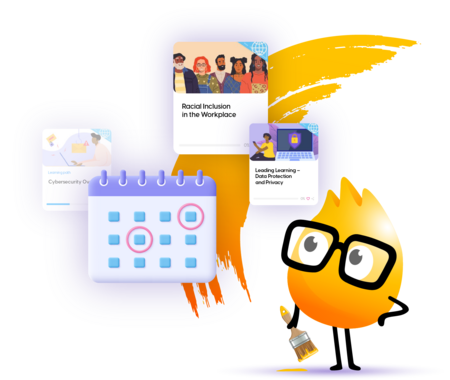Top 3 Reasons Your Salespeople Need Ongoing, Online Training
Picture this scenario. An employee gets hired as an Account Executive at a reputable and fast-growing startup focused on building autonomous vehicles. It’s October, the beginning of the last quarter of the year, and Sales Bootcamp doesn’t kick off until January. Like most rapid startups, hitting their annual goal is a top priority and the sales teams are heads down trying to close as many deals as possible. The Sales Manager sends the new Account Executive links to a few online folders loaded up with golden pitch decks from the last few years, their top 50 customer logos, and some presentations on positioning. She tells him to spend the next few weeks reading through everything, as well as shadowing others.
It’s no surprise that the Account Executive gets burned out quickly. He spends the next few weeks sitting at his desk reviewing the content he was given, scrolling through their website and different review sites, shadowing his colleagues and learning what he can. His first few months end up feeling a bit wasteful and uninspired; he is looking through a lot of the same content over and over, shadowing calls that go a bit over his head, and ultimately doing a lot of waiting. He certainly isn’t ready to contribute to that Q4 or annual goal with the more seasoned crew. His engagement and motivation begin to fade and he wonders if this was the right job for him, but figures he’ll wait and see after the new year.
Finally, January arrives and Sales Bootcamp begins (three months after he started) offsite and away from the office. Now, the real training happens! He has instructor-led courses, quizzes, pitch practice sessions, role-playing and more. When it ends, he’s reinvigorated, much more knowledgeable, and ready to close deals and make money.
Was this the end of his “training” and the beginning of his “selling”?
The answer to that question is a big no!
There were several things wrong with this scenario, all of which can be solved by properly leveraging a training platform. Ongoing, online learning is a best practice for numerous reasons from cost-effectiveness to higher employee retention, but for the purpose of this blog, we’ll focus just on three key reasons. Each of these is backed by a real-world quotation from one of our customers to prove that the success of your sales training will be exponentially better if you do it with the support of a training platform like Litmos.
1. Ensure product knowledge and continuous development. Training is not a one-and-done situation. Contrary to the scenario above where Sales Bootcamp is an annual activity “outside of work,” today’s salespeople need learning in the flow of work (most likely integrated into the CRM environment). To stay up-to-speed on products, services, messaging, and the customer experience promise, they need ongoing training and regular reminders of lessons learned. Ideally, they’ll also partake in regular “soft skills” training such as communication, negotiation, listening skills, personal development, and related. This will help bring out the very best in your people, beyond just their selling ability.
“We have developed a global sales training program that is a 16-week, intensive online learning program with follow-up touch points for the next 12 months. It is highly engaging and utilizes Litmos technology to engage the learner and to deliver interactive, video-rich content that uses a combination of self-authored and Litmos Heroes content. As a result of the new training program, we’ve increased sales and productivity by 18 percent.”
– Michael Vincent, Global Head of Learning at Travel Counsellors
2. Get sales on the field faster. A training platform enables you to quickly set up and automate your onboarding program, as well as establish the ongoing learning paths that will ensure long-term success for salespeople. You can include instructor-led courses and video-based ones, and require Video Assessments to make sure the salesperson is practicing and mastering what they’re learning. Unlike the un-directed learning assigned in the scenario above, the training platform can guide people through courses in a more strategic way, provide tests / quizzes on the material, and track progress to confirm that the information has been consumed. No time is wasted and sellers are ready to hit the ground running far more efficiently than if expected to learn on their own or wait for periodic, isolated training sessions.
“We were able to launch Litmos in a matter of days, not weeks or months, which allowed us to go to market a lot quicker than we had anticipated. We have been able to save a huge amount of time, man hours, and cost, which has added to the list of wins since launching the LMS. Our company performance has improved by ensuring training activities strategically align with our mission, and has enabled our sales team to be successful.”
– Nicholas Gregory, Global Sales Enablement Director at Sabre Corporation
3. Set your salespeople free to sell, sell, sell. Salespeople are the least likely group to want to be tied to a desk. Sure, your inside teams need office time, but many sales roles are designed to be on-the-go and onsite, meeting with customers. They should not be disconnected from learning content while they’re interacting with potential buyers. Give them anytime, anywhere, any device training that allows them to learn in the moment of need.
“We chose Litmos because of its ease-of-use, course library, and anytime-anywhere on any device capabilities. One of the greatest things about Litmos is the mobile user-interface. Whether you’re on your phone or tablet, on a bus, hotel or plane, it is always instantly accessible on any device. We see training as vital in creating excellent customer and employee experiences.”
– Rachel Begbie, Learning, Development & Wellbeing Director at Corinthia Hotels
These are just a few of the MANY reasons your sales teams should be trained with a learning management system (LMS). You’ll notice also that nothing happened in the live Sales Bootcamp in the opening scenario that couldn’t be delivered via the online platform. From their first day on the job, all the way to years later, training should be ongoing and accessible when and where they need it. Your revenue-generators will thank you for it and you’ll thank them back for their commitment and contribution.






